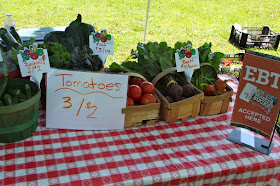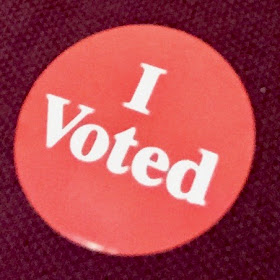 |
| in an era of pandemics, is our food system secure?
Photo by J. Harrington
|
As of this posting, it appears unlikely that, by late April, the country will have returned to what used to pass for normality, so we're going to float an alternative idea. We're anticipating that, if much of the country is still under various forms of coronavirus lockdowns, or federal martial law, a climate strike isn't going to be very noticeable. How about if, instead, we all commit to harassing our federal and state legislators to enacting Green New Deal legislation before the November elections?
Many politicians are going to be looking for votes come November. (Too many will also be looking for corporate campaign contributions.) We can loudly and clearly let candidates for reelection know that we want a Green New Deal enacted if they want our votes. A similar message can be delivered to those seeking to oust an incumbent. As long as Mitch McConnell is Senate Majority Leader, my expectations for success are tempered, but we might as well try. We need the practice and, at the moment, as far as I know, all that's been proposed at the federal level is a resolution.
 |
| will your legislators vote for a Green New Deal?
Photo by J. Harrington
|
In Minnesota, we have actual legislation proposed [HF 2836 and SF 3143]. Either is a good place to start but could probably be much improved if they incorporated language from the federal resolutions regarding agricultural changes and transitions related to secure, local food and carbon sequestration. If you wonder how and why more attention needs be paid to agriculture, please read this open letter from the Agroecology Research Action Collective. The COVID 19 pandemic has made clear many of the limitations that rural America labors under, including insufficient internet coverage and bandwidth and the need for better regional healthcare systems and access to such systems. It's unlikely that urban agriculture will ever be adequate to feed entire metropolitan areas, so we're looking at the need for better food systems that serve both large and mid-sized producers and individual and institutional consumers. One thing that's become clear to me as I've read about the effects of COVID 19 and how various communities have responded, we need to build better infrastructures across the rural-urban divide. We are indeed all in this together and we need each other whether we like it or not.
On the fifth day
the scientists who studied the rivers
were forbidden to speak
or to study the rivers.
The scientists who studied the air
were told not to speak of the air,
and the ones who worked for the farmers
were silenced,
and the ones who worked for the bees.
Someone, from deep in the Badlands,
began posting facts.
The facts were told not to speak
and were taken away.
The facts, surprised to be taken, were silent.
Now it was only the rivers
that spoke of the rivers,
and only the wind that spoke of its bees,
while the unpausing factual buds of the fruit trees
continued to move toward their fruit.
The silence spoke loudly of silence,
and the rivers kept speaking
of rivers, of boulders and air.
Bound to gravity, earless and tongueless,
the untested rivers kept speaking.
Bus drivers, shelf stockers,
code writers, machinists, accountants,
lab techs, cellists kept speaking.
They spoke, the fifth day,
of silence.
—2017
********************************************
Thanks for visiting. Come again when you can.
Please be kind to each other while you can.
No comments:
Post a Comment